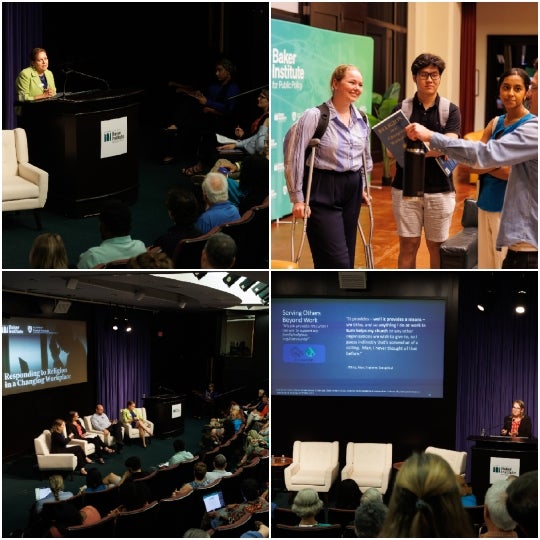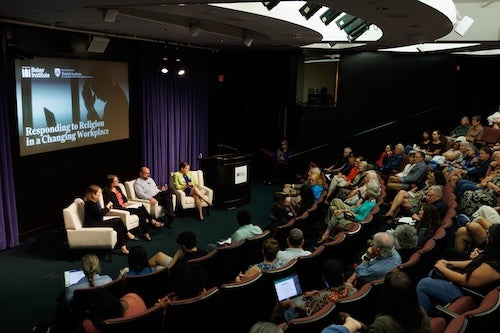Including religious identities in diversity, equity and inclusion efforts could positively impact workplace culture and communities as a whole, according to newly published research from Rice University’s Boniuk Institute for the Study and Advancement of Religious Tolerance.

“The workplace in the midst of these fraught times is a place we need to turn to, a place we need to examine, if we want to understand what it really means to get along with each other while expressing our deepest differences — what, in effect, a healthy religious pluralism really looks like,” said Elaine Howard Ecklund, the Herbert S. Autrey Chair and Professor of Sociology and director of the Boniuk Institute.
The new book, “Religion in a Changing Workplace,” was the focus of an Oct. 7 event sponsored by the Bryan J. and June B. Zwan Endowment and co-hosted by the Rice Baker Institute for Public Policy’s Religion and Public Policy Program and the Boniuk Institute. The event featured the book’s authors presenting their findings and answering discussion questions from a live audience. The research draws on more than 15,000 surveys and 300 in-depth interviews with oversampled minority populations to ensure a robust representation. The authors argue that embracing religious diversity in the workplace helps foster diversity of other kinds and that their data can show managers, organizational leaders and workers how to engage thoughtfully and respectfully with religion in the workplace.
“The workplace provides special kinds of opportunities for religious pluralism that really aren’t present in any other spaces in society,” Ecklund said. “Often we think that people want to remain privatized about their faith, but we show data and make arguments that people actually want to express their faith more.”
The interviews repeatedly showed that the workplace is one of the only sectors of society where people are likely to meet those who are different from themselves, the authors explained. “We often worry that talking about differences — particularly deeply important aspects of our identity like religion — creates the potential for conflict,” said Denise Daniels, co-author and professor at Wheaton College. “But avoiding or hiding these differences can also make people feel less connected to others and to their workplace more broadly. We show that respectful and nuanced engagement can create a path forward.”
Co-author Chris Scheitle, associate professor of sociology at West Virginia University, noted that, “Our data indicate that workers tend to be less satisfied and committed to their job if they cannot express their religion in the ways that they would like or if they are treated unfairly due to their religion. This can have practical implications for organizations.”
“We often send our children to schools with other people who are like us,” Ecklund said. “We go to religious organizations with other people who are like us. We funnel into universities with other people who are like us often, but there’s still a matter of diversity in our workplaces. We heard this over and over, and we show this through our survey results. People are exposed to people who are different from them. Workplaces are places where we ought to be attentive to religious differences and think of workplaces as a type of place in society where we can begin to learn how to practice a healthy religious pluralism.”
“Religion in a Changing Workplace” (Oxford University Press, September 2024) is available now.
This research was supported by a grant from the Lilly Endowment, Inc. (“Faith at Work: An Empirical Study,” #2017 0021, Elaine Howard Ecklund PI, Denise Daniels co-PI).

